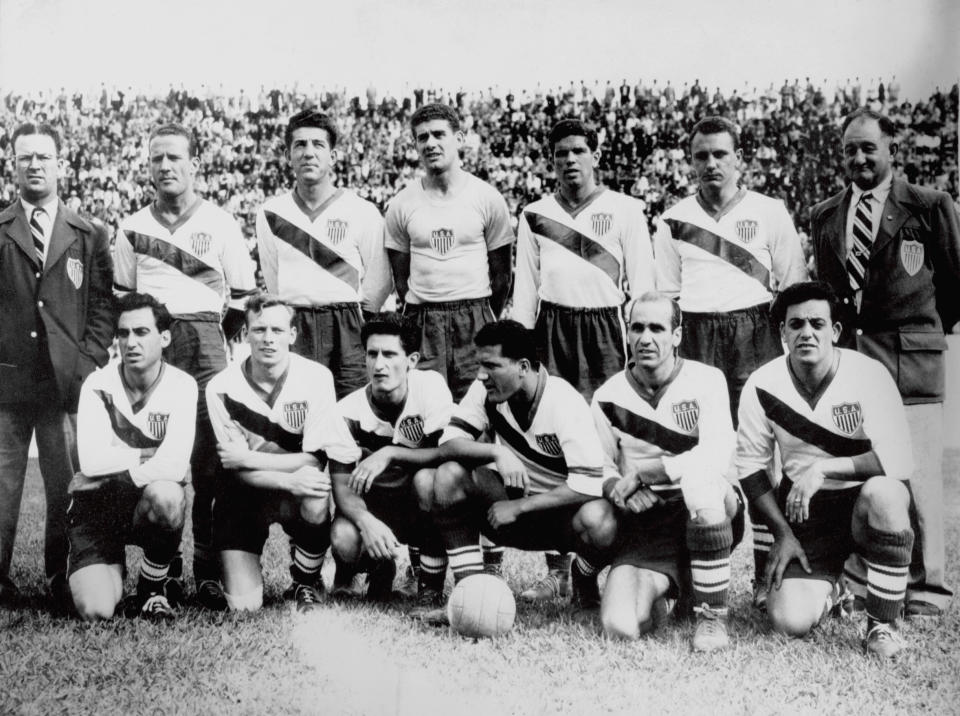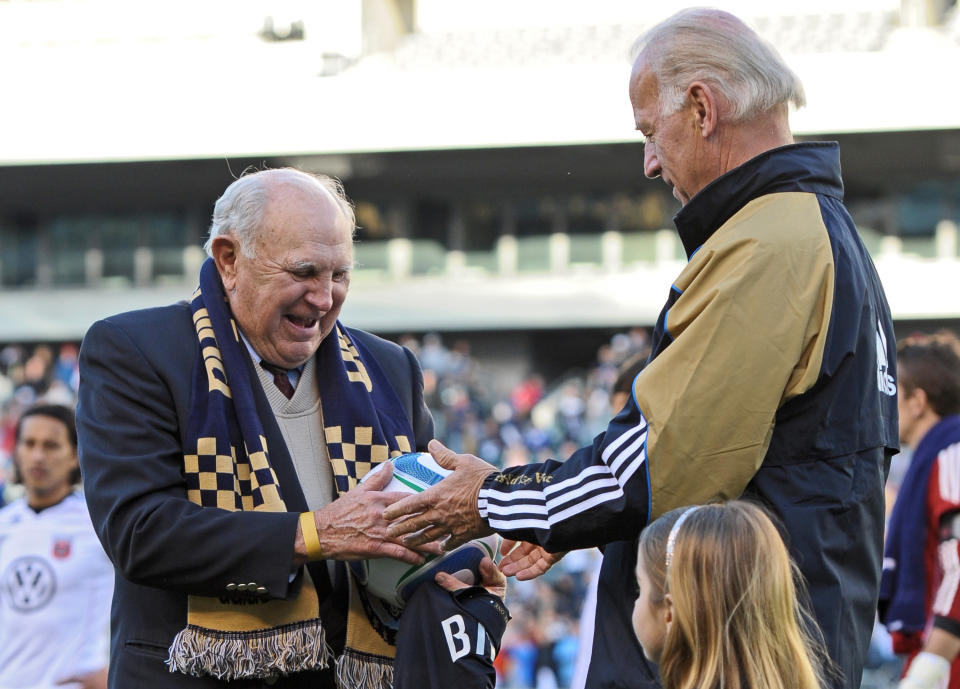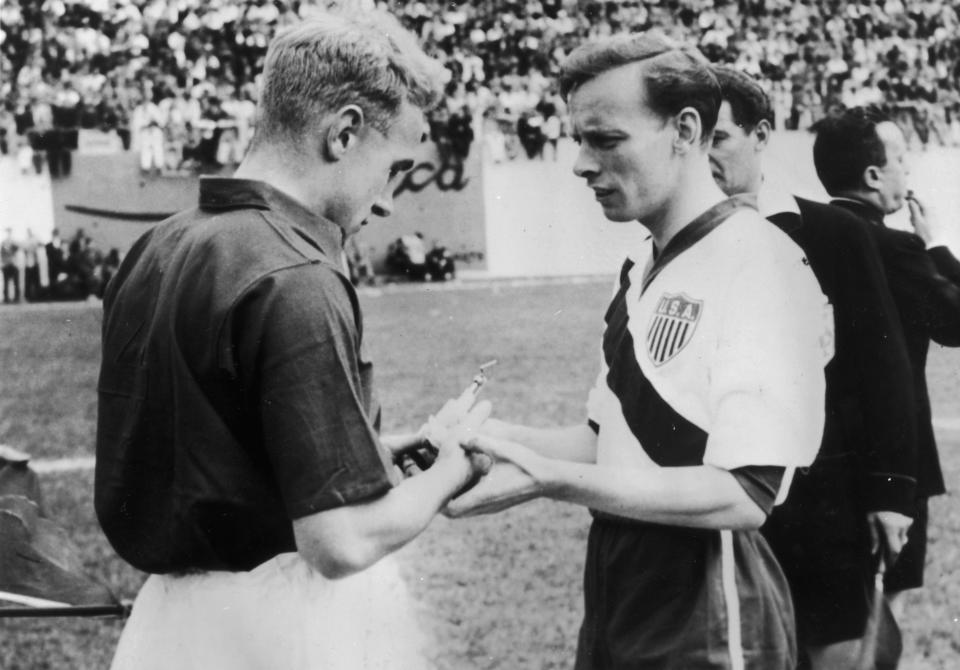World Cup shocks: USA keeper Frank Borghi shuts out England in 1950

It was the greatest surprise the World Cup has ever seen. It may remain the finest result in the United States’ footballing history. At the time, however, it only merited a couple of lines in the New York Times. That was still long enough to include a mistake: John Souza was identified as the man who had scored the only goal.
If a myth is correct, worse errors were made. It may be apocryphal, because evidence is in short supply, but the story is that some English newspapers assumed a 1-0 scoreline was a typographical error and amended it to a 10-0 or 10-1 victory for their side. It ranked as wishful thinking.
READ MORE: Iconic World Cup moments: Diana Ross’ spot of bother
READ MORE: World Cup one-hit wonders: Brazil’s Josimar
The “kings of football”, as the Brazilian press had dubbed them, had lost to the peasants. It remains the greatest shock in World Cup history, even if its significance in the country the victors represented only became apparent later.
Even the one American paper to cover the 1950 game in Belo Horizonte, the St Louis Post-Dispatch, failed to grasp the gravity of the result, with a headline of “U.S. Upsets England in Soccer” on a page dominated by a picture of a large fish that had been caught in Massachusetts.
It took time for its significance to be understood. It was subsequently dubbed “the Miracle on Grass”; it was a variant on “the Miracle on Ice,” the United States’ 1980 Winter Olympics win over the Soviet Union at ice hockey. Go back almost seven decades, however, miracle workers went largely unrecognised.

Whereas some World Cup heroes get mobbed at the airport on their returns, there was only one person waiting for Walter Bahr, who set up the winning goal, in Philadelphia: his wife. The Pennsylvanian gym teacher reckoned he was barely interviewed for a quarter of a century afterwards but, thankfully, has been called upon to give plenty of accounts since.
Because the United States were the 500/1 outsiders to win the tournament. England were 3/1 favourites in a time before their notions of superiority had been destroyed. They had not deigned to take part in the first three World Cups. They were unbeaten on the major stage. They had never lost a home game to anyone outside the British Isles.
SLIDESHOW: The 32 star players for every World Cup nation (Click image below)
And they were confronted by a bunch of part-timers. The Americans’ cast list would seem a clichéd by the standards of the early rounds of the FA Cup – a teacher, an undertaker, a dishwasher, a truck driver, a factory worker, a postman – but was a complete anomaly in the World Cup. Ten of their squad were uncapped before the tournament. England had some of the planet’s most famous players.
But arrogance was a factor. It is safe to say the FA got their priorities wrong. England’s most celebrated player, Stanley Matthews, was sent in a squad who went on a tour of North America for exhibition games. He missed his country’s first ever World Cup win, against Chile, and was then not picked for their second game. “Come the final whistle, I thanked my lucky stars I hadn’t been part of it,” Matthews later said. This was not a managerial error: England’s sole selector was not manager Walter Winterbottom but the president of the Football League Arthur Drewry, who was also a Grimsby fish merchant.

It was no way to pick a side, but England were overconfident. “In the fifties, we still felt that we could teach the world a few things,” England captain Billy Wright later told the BBC. The winger Tom Finney added: “We thought they were there to make up the numbers and it would be a formality.” How wrong they were.
“They thought we were a doormat,” the American defender Charlie Colombo told FourFourTwo. Perhaps some of his team-mates thought that, too. “I don’t think any of us went in there thinking we had a chance of winning,” Bahr told the BBC.
PLAY: World Cup famous goal scorers quiz
PLAY: World Cup classic kits
It seemed a damage-limitation exercise. England hit the woodwork twice inside the first 12 minutes alone. But as half-time beckoned, Bahr let fly from 25 yards. Centre-forward Joe Gaetjens – and not Souza – dived and diverted it past goalkeeper Bert Williams. “A big deflection,” Williams claimed, late in life. Alf Ramsey, England’s right-back and 1966 World Cup-winning manager, claimed Gaetjens ducked to try and avoid it. Even Bahr wondered if it ricocheted in off his team-mate.
But the Brazilian crowd got behind the underdogs. The American resistance continued. Goalkeeper Frank Borghi, who earned his living by driving hearses for funerals and was another of the five-man contingent from St Louis, excelled. Depending on accounts, England hit the woodwork as many as six times. When the prolific striker Stan Mortensen broke clear, Colombo stopped him with a tackle that sounds more suited to an oval-ball sport. “Anybody in the NFL would have been proud of it,” right-back and postman Harry Keough told FourFourTwo.

An honest Bahr later told the Guardian: “We won but we certainly did not outplay England.” But win they did. It was a victory with consequences. England duly lost to Spain and failed to qualify from the group stages. The British press wondered if their conquerors were immigrants who were found on Ellis Island.
And while FIFA cleared the United States of wrongdoing, Gaetjens, the Belgian Eddie Maca and the captain for the day, Eddie McIlvenney, were not actually American citizens; the goalscorer and the skipper never became them, the Scot McIlvenney having been selected on the pretext he was claiming American citizenship. He soon returned across the Atlantic and joined Manchester United.

The match-winner met with an unhappier ending. Gaetjens had represented his native Haiti before moving to New York in 1947. A part-time dishwasher while studying at Columbia University, he subsequently played in France, returned to Haiti and had a brief third international career in their colours, but his solitary goal came against England.
He died in prison in 1964, an innocent man probably killed by the militia of the Haitian dictator “Papa Doc” Duvalier. He was the American who wasn’t an American, who scored America’s most famous World Cup goal, but its fame mushroomed long after his lifetime ended. And it could continue to grow: given how unlikely the United States’ win was, it may always remain the World Cup’s biggest shock.

 Yahoo Sport
Yahoo Sport 







































